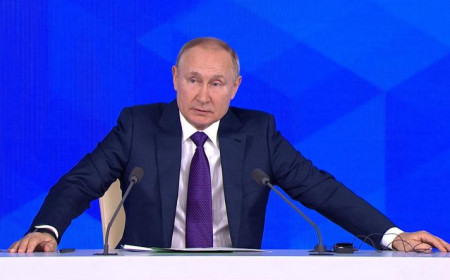
Speaking on the direct line with the people of Russia combined with his annual news conference, President Vladimir Putin has touched upon a bulk of essential things related to the country’s domestic affairs. They consumed most of the time. Also, the head of state delved into world politics, particularly Russia's positioning on the international stage.
Regards to Macron
The quintessence of Moscow's stance in its policy towards the collective West seems to have been Putin's answer to a French journalist's question about a possible meeting with his French counterpart Emmanuel Macron. The succinct response made it clear that Russia, being a self-reliant progressively developing nation, does not care about any pressure coming from the collective West or depend on it somehow.
"At some point, the President of France stopped communicating with us. It was not us, not me who stopped talking with him. He did. If there is an interest, we are ready to resume our relations. If there is no interest, we will manage without it. That is all. <...> If European countries, and the President of France, in particular, do not wish to communicate with us – so be it, no means no. We have things to work on and to keep ourselves busy," Putin said.
Integration processes in the post-Soviet space
Answering the avalanche of questions, Putin said Russia was erecting all the integration associations, including the EAEU and the CIS, on a voluntary basis for everyone involved. "Russia is building all integration associations solely on a voluntary basis. Trade turnover between the EAEU countries is steadily growing. The opening of labor and capital markets, mutual cooperation maintenance, effective use of advantages we inherited from the Soviet era in terms of having a unified infrastructure, transport, and so on, presence of a language of interethnic communication. <...> All of this creates conditions that increase our competitive advantages in global markets, resolve problems not only in the economy but also in the public sphere, and add to people’s prosperity," he said.
Moldova and Armenia
As per integration processes, the Russian President’s stance on foreign policies by Moldova and Armenia deserves special notice.
Speaking about Moldova and its leaders’ unwillingness to engage in the post-Soviet integration processes, Putin noted that Moldova's presence in the CIS is of little value to Russia. "Let them do whatever they want to. The presence of this country in the CIS holds no great value for us," the Russian leader stressed.
Referring to Armenia, Putin pointed to the futility of its potentially terminated CIS, EAEU or CSTO membership, while Prime Minister Nikol Pashinyan’s absence at the recent summits was brought about by his country’s internal processes, not waiver of further cooperation. "As for Armenia, it features complicated processes related to Karabakh. We all understand this," the Russian leader said. "It was not us but Armenia that recognized that Karabakh is part of Azerbaijan. They did this on their own initiative, in fact, and we were not particularly informed that they were preparing to make such a decision."
China
The President touched upon Russia's relations with China, emphasizing the unprecedented level of bilateral interaction. Putin expects their trade turnover to grow by 30% in 2023, reaching some $220-230 billion. "We have said many times that we hope to reach $200 billion in trade next year. We will actually get there this year, not next year, over $200 billion this year. We will do the calculations in the first quarter, and I think we will have $220–230 billion [dollars]. <...> Last year, we achieved a 31 percent increase in trade, and we will see a 30 percent increase this year. We are steadily deepening our economic ties across the board," he noted.
"I am also pleased at the diversification of our relations. We are expanding ties in infrastructure, building bridges and roads, and cooperating in high-tech industries, and we will continue in the same vein," Putin added.
Who blew up the Nord Streams?
Out President has finally come right out and named those behind Nord Stream acts of sabotage, as Kremlin used to avoid specific references to the culprit. "We didn’t blow up Nord Stream 1 and partly Nord Stream 2. This was done, most likely, by the Americans or someone at their instruction," he said.
Also, the head of state drew attention to the fact of Germany’s resistance to resumed gas supplies. "If they don’t want to, they don’t have to. They are seeing skyrocketing prices, with entire industries being shut down — the glass, chemical sectors, metallurgy is suffering. And, hence, they have problems with everything connected to this," the head of state stressed. "The German economy is likely to go into the red, slightly, but in the red. But this is their choice, not ours." Accusations that Russia has stopped natural gas supplies to the EU are "complete nonsense", as he put it.
Defining the collective West
Asked by a journalist what he would have advised his younger self from more than 20 years ago, Putin said that he would first have cautioned himself against “excessive gullibility” in relations with “our so-called partners” — a term he has repeatedly used when describing the collective West. Simply put, the West is a wrongo. This is sort of a message by the Russian leader to the entire collective West — words belonging to the man in charge of a truly sovereign state, such as Russia.









